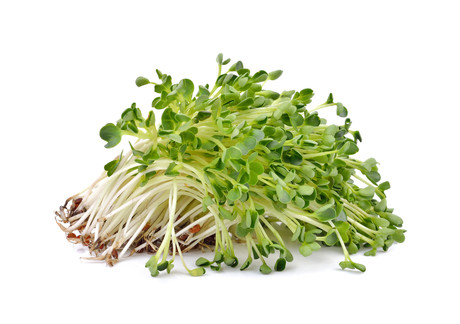Oh for a kill step

Eating anything raw carries a risk, as there is no kill step to reduce any pathogen load. But not all raw ingredients are equally risky. Vegetables that grow in the ground are more likely to be contaminated with bacteria, since runoff from animal waste is likely the source of contamination. Fruits and vegetables that have to be peeled are less likely than unpeeled to make you sick, but sprouts — sprouts are just plain risky. Sprouts are a common source of foodborne disease as they must be grown in water, which also happens to be a perfect medium for growing bacteria.
Washing salad ingredients in chlorinated water is helpful but does not eliminate risk.
Rachelle Williams, Chair of the Food Safety Information Council, explained, “Washing sprouts has been found to be not very effective as laboratory studies have shown that bacteria can be internalised in the sprouts, making it difficult wash off/sanitise, and bacteria can be protected in a biofilm on the sprout surface.
“People in the four vulnerable demographics (young children, people 70+, immune-compromised or pregnant) should not eat uncooked sprouts of any kind.”
SA Health Chief Medical Officer and Chief Public Health Officer Professor Paddy Phillips explained that there have been 21 confirmed cases of Salmonella havana linked alfalfa sprout products produced by Adelaide business SA Sprouts when announcing a product recall.
Products included in the recall are alfalfa (125 and 200 g tubs, 1 kg bags), green alfalfa (125 g tubs), alfalfa and radish (125 g tubs), alfalfa and onion (125 g tubs), alfalfa and mustard (125 g tubs), alfalfa and Chinese cabbage (125 g tubs), alfalfa and garlic (125 g tubs), salad mix (175 g tubs) and gourmet sprouts (100 g trio pack with alfalfa, snow pea, small sprouted bean).
It’s not just sprouts
In the US at least 144 people have recently been infected by Cyclospora, a microscopic parasite, after eating Del Monte brand precut fresh vegetables. Cyclospora is spread by people ingesting food or water contaminated with faeces. Cyclospora needs time (typically at least 1–2 weeks) after being passed in a bowel movement to become infectious for another person and so is unlikely to be passed directly from one person to another.
Washing or other cleaning processes may not be sufficient to eliminate the parasite from fresh produce or other raw foods, according to the FDA.
Heat and Control brings coffee and tea processing solutions to MICE 2026
Heat and Control will showcase its latest coffee and tea processing, packaging and inspection...
AI-based hyperspectral camera to enable more food applications
A team of experts is developing a compact hyperspectral camera that uses AI to perform complex...
Call for comment on endo-1,4-beta-xylanase as a processing aid
Food Standards Australia New Zealand (FSANZ) is calling for comment on an application to permit...








